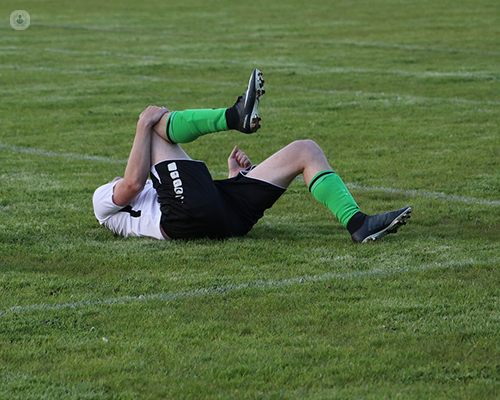Knee sports injuries: Do I need surgery?
Written by:The knee is one of the most easily injured joints in the body, especially among sports athletes. Some knee sports injuries may require surgical treatment to correct them, whilst others may only need conservative treatments like injection therapies.
Here, Mr Numan Shah, renowned consultant trauma and orthopaedic surgeon based in Manchester, provides an expert insight into knee sports injuries, including if surgery is always needed to correct them.

What are the most common knee-related sports injuries?
The most common knee sports injuries that I see in my clinic are related either to the ligaments around the knee themselves or to the internal part of the knee.
Externally, the ligaments affected are:
- The medial collateral ligament or the lateral collateral ligament
- The quadriceps tendon that attaches the quadriceps muscle in the thigh to the top of the kneecap
- The patella tendon that attaches the lower part of the kneecap to the shin bone
Internally, the main area that I see damaged is:
- The meniscus that sits between the thigh bone (femur bone) and the shin bone (tibia bone)
There are two parts of the knee: the medial (the inside of the knee) and the lateral (the outside of the knee). In the medial compartment and the lateral compartment, there is the meniscus, which can be damaged by trauma, injury, or over time with degeneration. This damage can lead to symptoms, such as mechanical symptoms, which can cause locking, giving way, and some clicking.
As well as this, the anterior cruciate ligament can also be damaged, which is typical with a pivoting-type injury (non-contact injury) that footballers commonly suffer from. Furthermore, there can be a posterior cruciate ligament injury or even a posterolateral corner injury, which is a bit rarer but possible nonetheless.
Do sports athletes always require surgical correction of knee injuries?
From experience, we know that a lot of our sports athletes want to be back and fighting as soon as possible after an injury because any downtime from their game time does adversely affect them.
Despite this, no, not all knee injuries require surgical intervention. Some knee injuries can be treated with a watch and wait management strategy, having the appropriate physiotherapy at the right time. Other knee injuries may benefit from injection therapies that I carry out, such as platelet-rich plasma injections, Ostenil injections which is viscosupplementation, or hyaluronic acid injections. As a last resort, steroid injections can be considered, but I am always a little bit loath to go down this route for particular sports athletes.
There are certain knee injuries that do need to be managed surgically, but again, this is determined after a detailed consultation, examination and discussion with the patient.
How effective can physiotherapy be in terms of treatment for knee sports injuries?
For knee sports injuries, physiotherapy can be extremely effective. Even after surgery, physiotherapy is usually recommended because this type of therapy addresses the muscles around the joint - and the knee joint is the largest joint in the body that relies on muscles for stability and support. Hence, a physiotherapist will work closely with the patient to rehabilitate the muscles. If the muscles are of good tone and are functioning well, then this will lead to a very good overall outcome for the patient's knee.
What I also recommend with physiotherapy is to combine it with hydrotherapy, which is physiotherapy within a pool setting. Hydrotherapy can provide a general feeling of wellbeing and water can provide buoyancy. Buoyancy will allow the muscles to focus solely on moving the joint rather than supporting the whole body, which they are designed to do. With buoyancy, the muscles won’t need to work as hard and they will be able to rehabilitate much better, so certainly, physiotherapy is recommended.
What is the standard recovery time like for athletes undergoing rehabilitation?
The standard time can vary from patient to patient. It depends on the type of injury that was sustained initially, and what the treatment and the management was for that injury. Usually, we find that if particular clinical problems or injuries are treated surgically, then patients are able to return to their level of activity sooner. However, this isn’t the case for all injuries.
Generally, I give a ballpark figure of six weeks to recover from soft tissue injuries, but this is typically with a caveat that the recovery could extend to 12 weeks (three months). A three-month frame is a very good time period to look at any type of knee injury that may have been sustained, allowing time for recovery and rehabilitation as well. Once the body has recovered, an assessment can be done to plan a return to sporting activity.
I always recommend having a short return to sporting activity. For example, if a patient plays football and is playing for a team and the knee feels just as strong as it did prior to the injury, I always recommend to go on at the end of the fixture of the game to play the last 20 to 30 minutes. By this time, most of the other players will be tired, and thus hopefully won’t have much stamina left and won’t be as vigorous with their tackles. This will allow the patient an easier return to sporting activity and the opportunity to gradually build themselves up. Again, it’s important that all patients give their body the necessary time to recover in order to maintain that recovery going into the long term.
If you require treatment and management for a knee sports injury and you would like to consult your options with an expert, don’t hesitate to book an appointment with Mr Numan Shah via his Top Doctors profile today.


